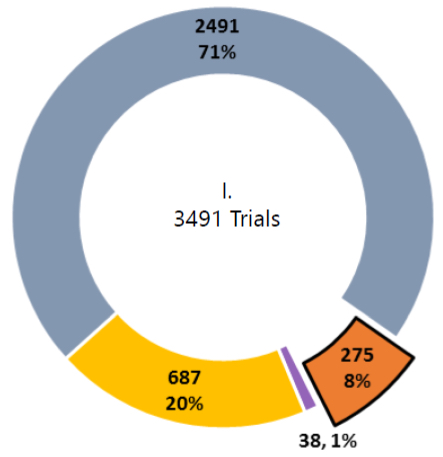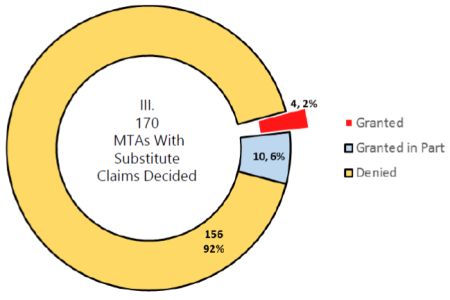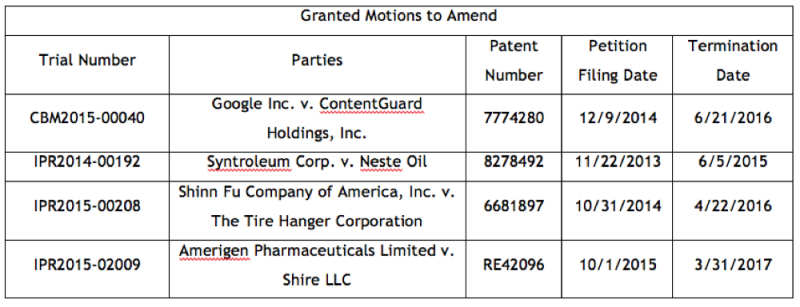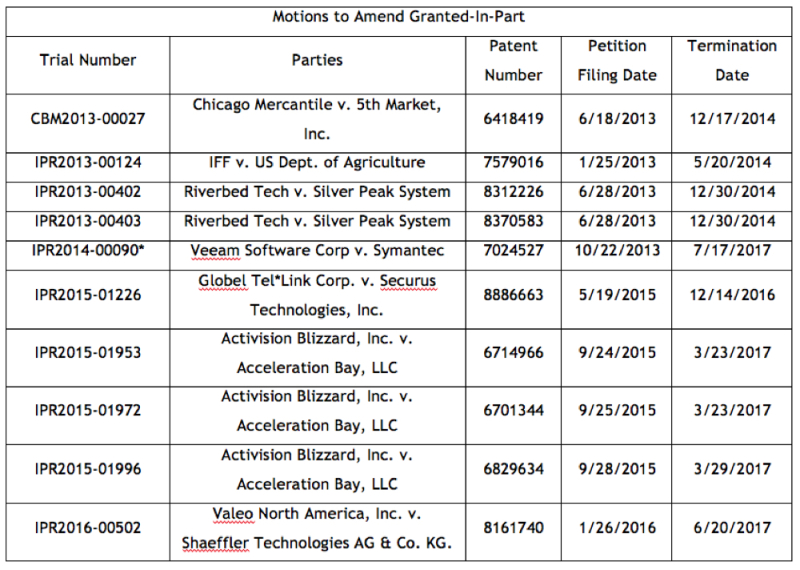
On January 12, 2018, the U.S. Patent and Trademark Office's Patent Trial and Appeal Board announced that it had updated its Motion to Amend Study to include all AIA trials through the end of Fiscal Year 2017 (which ended on September 30, 2017). The original study included data through April 30, 2016. At that time, only two motions to amend had been granted outright, with another four granted-in-part. This study was updated last year with data through May 31, 2017. At that time, two additional motions to amend had been granted outright, with an additional four granted-in-part. The current study includes no new motions to amend granted outright, but there are two more that have been granted-in-part. In total, fourteen motions to amend had been granted at least in part as of September 30, 2017 (out of a total of 275 completed trials in which a motion to amend was filed). Of course, the cut off for this study misses any impact of the October 4, 2017 Aqua Products, Inc. v. Matal decision. We, however, believe that no additional motions to amend have been granted so far this fiscal year.

This updated Motion to Amend Study includes several charts that present data that was obtained. The first such chart reproduced above highlights just how few trials actually include a motion to amend. The Purple and Yellow slices represent trials that are still pending, either with or without a filed motion to amend, respectively. They were otherwise not included in the calculations that followed. For completed trials, only 275 out of 2,766 trials (or 8%) included a motion to amend. The Board counted a trial as "completed" when it was terminated due to settlement, when there was a request for adverse judgement, when it was dismissed, or when there was a final written decision. Moreover, joined or consolidated trials were only counted once in the statistics. The second chart provided by the Board (not reproduced here) explains the outcome of the motions to amend, whether it was decided in the Final Written Decision, whether it was rendered moot because the claims were patentable, whether it was withdrawn, whether the case settled, whether adverse judgement was requested, whether the case was dismissed, or whether the motion was solely to cancel the claims. Out of the 275 trials, only 170 motions to amend with substitute claims were decided.

Tellingly, the third chart shows the outcome of the 170 decided motions to amend in which substitute claims were proposed. In 156 of these cases, or 92%, the Board denied the motion. The four motions to amend that were granted outright represent 2% of all motions to amend with substitute claims that were decided, and represent a much smaller percentage of all motions to amend. The ten motions to amend that were granted-in-part represented 6% of the total decided. The Study included a separate spreadsheet that contained the data from the 275 trials. This spreadsheet explains in which post-issuance proceedings that motions to amend were granted. The following tables were compiled from this data:


IPR2014-00090 was interesting because the Board originally denied the motion to amend on April 23, 2015. However, the Federal Circuit vacated the case in part because it found that the Board had erred on its sole ground for denying the motion. As a result, on remand, the Board granted the motion-in-part.
Looking forward to the first few months of fiscal year 2018, we do not believe that the Board has yet granted any motions to amend. This is interesting because the Aqua Products case came out just as the fiscal year was starting. At that time, approximately 38 motions to amend were pending. It is possible that no such motions were granted because practitioners were essentially stuck with the briefing that had already occurred. The Board has been willing in most cases to allow additional briefing, but it has not been a blanket rule in all case. As an example, we need look no further than the first PTAB paper after the Aqua Products case, Minerva Surgical, Inc. v. Hologic, Inc., IPR2016-00868, Paper 57. In that case, the Chief Judge "determined that good cause exists to extend the one-year period for issuing a Final Written Decision" pursuant to 37 C.F.R. § 42.100(c). This order was most likely entered on October 5, 2017 because the one-year deadline was set to expire on October 6, 2017. Nevertheless, when the Final Written Decision issued on December 15, 2017, the Board held that "considering the entirety of the record before us, we determine that the preponderance of the evidence shows that the proposed substitute claims are not patentable over the prior art of record." Cynically, one could speculate that the Board had already come to this conclusion and merely used the language of Aqua Products to insulate its decision. Nevertheless, the Board in that case did allow the parties additional briefing, so it is probable that the Patent Owner was able to put forth its best argument. It remains to be seen what will happen in the more recent cases that have only just been instituted, because the Patent Owners in these cases will be able to take full advantage of the knowledge of the Aqua Products case. Of course, we will probably need to wait about a year for those cases to work through the system. Nevertheless, they should be captured in some future update of the PTAB's Motion to Amend Study.